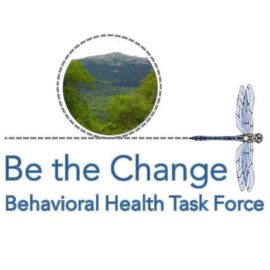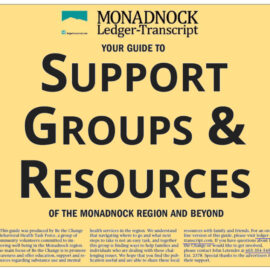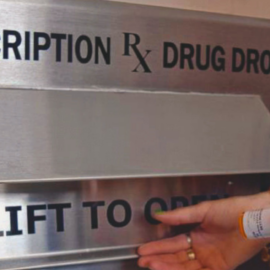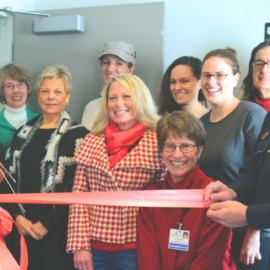Be the Change: Empowering Our Community for Better Behavioral Health

Be the Change: A Community Effort to Improve Health and Well-Being
 In 2012, Monadnock Community Hospital (MCH) recognized the urgent need for enhanced behavioral health support in the Monadnock Region. Through the Community Health Needs Assessment (CHNA), significant health challenges were identified, including the need for better mental health services and addiction recovery support. As a result, MCH and partner organizations and individuals launched the Be the Change initiative, a community-driven program focused on improving behavioral health support throughout the region.
In 2012, Monadnock Community Hospital (MCH) recognized the urgent need for enhanced behavioral health support in the Monadnock Region. Through the Community Health Needs Assessment (CHNA), significant health challenges were identified, including the need for better mental health services and addiction recovery support. As a result, MCH and partner organizations and individuals launched the Be the Change initiative, a community-driven program focused on improving behavioral health support throughout the region.
Building on Community Needs
The foundation of Be the Change lies in the findings of the 2012 CHNA, which highlighted key areas of concern, including behavioral health services, substance abuse prevention, and health education. The first meeting of Be the Change took place in May 2014 with just seven members. However, through dedication, community partnerships, and support from local organizations such as the Monadnock Ledger Transcript and 100+ Women Who Care, the initiative quickly gained traction.
Expanding Behavioral Health Support
 A critical aspect of behavioral health support in the Monadnock Region is actively addressing substance abuse and mental health challenges through the Be the Change initiative, which has successfully partnered with local organizations, schools, and law enforcement to provide valuable resources such as Narcan training, peer support groups, and the installation of a Prescription Drug Take Back Box at the Peterborough Police Department—the only one in the Eastern Monadnock Region and Western Hillsborough County. Early on, Be the Change also created and distributed a comprehensive Resource Guide to all households in the MCH service area, connecting residents with vital local health and wellness resources. These efforts have played a critical role in ensuring the safe disposal of medications and reducing the risk of prescription drug misuse in the community.
A critical aspect of behavioral health support in the Monadnock Region is actively addressing substance abuse and mental health challenges through the Be the Change initiative, which has successfully partnered with local organizations, schools, and law enforcement to provide valuable resources such as Narcan training, peer support groups, and the installation of a Prescription Drug Take Back Box at the Peterborough Police Department—the only one in the Eastern Monadnock Region and Western Hillsborough County. Early on, Be the Change also created and distributed a comprehensive Resource Guide to all households in the MCH service area, connecting residents with vital local health and wellness resources. These efforts have played a critical role in ensuring the safe disposal of medications and reducing the risk of prescription drug misuse in the community.
Narcan Training and Substance Abuse Prevention
Substance abuse prevention has been at the forefront of the Be the Change agenda. Recognizing the need for life-saving interventions, Be the Change trained community members on the use of Narcan, a medication designed to reverse opioid overdoses. These training sessions have had a tangible impact, with parents sharing stories of how they were able to save their children’s lives because of the training they received.
In addition, the initiative has partnered with local schools, involving all three schools in the region to support teacher workshops and student presentations aimed at addressing addiction and substance abuse issues.
Addressing Behavioral Health and Coordination of Care
In the Monadnock Region, behavioral health has long been identified as a pressing issue. The 2013 CHNA Implementation Plan emphasized the importance of enhancing behavioral health services and improving care coordination. The Be the Change initiative has contributed to this effort by collaborating with organizations such as Monadnock Family Services and participating in community coalitions focused on behavioral health. By fostering a network of providers and educators, the initiative has improved communication between services and increased access to mental health resources.
Behavioral Health and Substance Use in the Monadnock Region
The Be the Change initiative has taken significant steps to address the rising need for behavioral health and substance use support in the Monadnock Region. The impacts of the COVID-19 pandemic have exacerbated underlying issues related to mental health, including increased social isolation, economic insecurity, and housing concerns. A CDC study in June 2020 found that 40.9% of respondents reported at least one adverse mental or behavioral health condition, with 30.9% experiencing symptoms of anxiety or depression [1].
Access to care and overcoming stigma remain barriers for many individuals in the Monadnock Region. Community members report long delays when setting up mental health appointments, and stakeholders have observed that the stigma around mental health is still prevalent, despite improvements in communication about self-care.
Additionally, Substance Use Disorder (SUD) remains a concern. While opioid-related substance use has declined, methamphetamine use is now on the rise. For instance, data reveals that Greater Monadnock area teens use substances at a slightly higher rate than their peers across New Hampshire. In 2019, 25.3% of Monadnock teens reported using marijuana, and 2.8% reported using methamphetamines, a concerning statistic that requires continued community intervention [2].
Teen Mental Health and Substance Use
Youth in the Monadnock Region face unique behavioral health challenges. A 2019 survey found that over 30% of Greater Monadnock teens reported feeling sad or hopeless for two consecutive weeks, and nearly one in five teens had seriously considered suicide. In terms of substance use, 13.6% of teens reported using prescription drugs without a prescription, and 2.8% had tried methamphetamine [2]. These alarming statistics highlight the need for continued efforts like Be the Change to provide mental health resources and substance use prevention programs to the region’s youth.
[1] Mental Health, Substance Use, and Suicidal Ideation During the COVID-19 Pandemic — United States, June 24–30, 2020
[2] Greater Monadnock Survey Results
Community Collaboration
The Be the Change initiative, founded as a Behavioral Health Task Force, stands out for its collaborative nature. Monadnock Community Hospital partnered with local agencies, including the Peterborough Police Department, local fire departments, and resource centers, to create a united front in addressing mental health and addiction challenges. This task force brings together key community partners, schools, and parents, strengthening the support network for those struggling with addiction and mental health issues.
Educational Initiatives and Resources
One key aspect of the task force’s mission is to raise awareness and provide education on behavioral health. Regular community education programs, peer support groups, and Narcan training sessions are vital components of this strategy. These efforts aim to empower the Monadnock community with life-saving knowledge and foster a culture of prevention and support.
Collaboration and Community Engagement
The success of Be the Change is rooted in its collaborative approach. From partnerships with local organizations to school involvement and media outreach, the initiative has engaged the entire Monadnock community. Its work aligns with MCH’s broader mission to improve the health and well-being of the region, as outlined in the 2021-2024 CHNA.
This community-led initiative has proven that small steps, when taken together, can lead to significant change. Be the Change continues to grow, empowering residents to take an active role in creating a healthier, more connected Monadnock Region.
Array
(
[section_title] =>
[section_text] =>
[posts_selection] => auto_taxonomy_terms
[section_posts] => Array
(
[0] => WP_Post Object
(
[ID] => 40203
[post_author] => 9192204
[post_date] => 2025-05-27 10:35:28
[post_date_gmt] => 2025-05-27 14:35:28
[post_content] =>
[post_title] => Honoring Our EMS Heroes: Captain Tim Quinn Receives Inaugural Lauren Morton Award
[post_excerpt] =>
[post_status] => publish
[comment_status] => closed
[ping_status] => closed
[post_password] =>
[post_name] => ems-event-2025
[to_ping] =>
[pinged] =>
[post_modified] => 2025-09-10 15:30:20
[post_modified_gmt] => 2025-09-10 19:30:20
[post_content_filtered] =>
[post_parent] => 0
[guid] => https://monadnockcommunityhospital.com/?p=40203
[menu_order] => 0
[post_type] => post
[post_mime_type] =>
[comment_count] => 0
[filter] => raw
)
[1] => WP_Post Object
(
[ID] => 40085
[post_author] => 9192204
[post_date] => 2025-04-30 16:46:45
[post_date_gmt] => 2025-04-30 20:46:45
[post_content] =>
[post_title] => Our 2024 Community Health Needs Assessment
[post_excerpt] =>
[post_status] => publish
[comment_status] => closed
[ping_status] => closed
[post_password] =>
[post_name] => chna-2025
[to_ping] =>
[pinged] =>
[post_modified] => 2025-09-10 15:35:53
[post_modified_gmt] => 2025-09-10 19:35:53
[post_content_filtered] =>
[post_parent] => 0
[guid] => https://monadnockcommunityhospital.com/?p=40085
[menu_order] => 0
[post_type] => post
[post_mime_type] =>
[comment_count] => 0
[filter] => raw
)
[2] => WP_Post Object
(
[ID] => 40071
[post_author] => 9192204
[post_date] => 2025-04-29 16:41:34
[post_date_gmt] => 2025-04-29 20:41:34
[post_content] =>
[post_title] => Community Benefits 2025: Strengthening Health, Together
[post_excerpt] =>
[post_status] => publish
[comment_status] => closed
[ping_status] => closed
[post_password] =>
[post_name] => community-benefits-2025
[to_ping] =>
[pinged] =>
[post_modified] => 2025-08-22 17:32:56
[post_modified_gmt] => 2025-08-22 21:32:56
[post_content_filtered] =>
[post_parent] => 0
[guid] => https://monadnockcommunityhospital.com/?p=40071
[menu_order] => 0
[post_type] => post
[post_mime_type] =>
[comment_count] => 0
[filter] => raw
)
[3] => WP_Post Object
(
[ID] => 38374
[post_author] => 9192204
[post_date] => 2024-08-04 11:23:33
[post_date_gmt] => 2024-08-04 15:23:33
[post_content] =>
[post_title] => MCH Community Benefits Program 2024: Making a Difference Together
[post_excerpt] =>
[post_status] => publish
[comment_status] => closed
[ping_status] => closed
[post_password] =>
[post_name] => community-benefits-2024
[to_ping] =>
[pinged] =>
[post_modified] => 2025-09-10 15:35:00
[post_modified_gmt] => 2025-09-10 19:35:00
[post_content_filtered] =>
[post_parent] => 0
[guid] => https://monadnockcommunityhospital.com/?p=38374
[menu_order] => 0
[post_type] => post
[post_mime_type] =>
[comment_count] => 0
[filter] => raw
)
[4] => WP_Post Object
(
[ID] => 38193
[post_author] => 9192204
[post_date] => 2024-07-25 15:21:40
[post_date_gmt] => 2024-07-25 19:21:40
[post_content] =>
[post_title] => How MCH's Nonprofit Mission Serves Our Community
[post_excerpt] =>
[post_status] => publish
[comment_status] => closed
[ping_status] => closed
[post_password] =>
[post_name] => your-community-your-health
[to_ping] =>
[pinged] =>
[post_modified] => 2025-09-12 11:36:19
[post_modified_gmt] => 2025-09-12 15:36:19
[post_content_filtered] =>
[post_parent] => 0
[guid] => https://monadnockcommunityhospital.com/healthcare-jobs-copy/
[menu_order] => 0
[post_type] => post
[post_mime_type] =>
[comment_count] => 0
[filter] => raw
)
[5] => WP_Post Object
(
[ID] => 38400
[post_author] => 9192204
[post_date] => 2024-07-20 11:29:15
[post_date_gmt] => 2024-07-20 15:29:15
[post_content] =>
[post_title] => Celebrating the Courage and Commitment of Our EMS Heroes 2024
[post_excerpt] =>
[post_status] => publish
[comment_status] => closed
[ping_status] => closed
[post_password] =>
[post_name] => ems-event-2024
[to_ping] =>
[pinged] =>
[post_modified] => 2025-08-20 16:51:52
[post_modified_gmt] => 2025-08-20 20:51:52
[post_content_filtered] =>
[post_parent] => 0
[guid] => https://monadnockcommunityhospital.com/ems-event-2023-copy/
[menu_order] => 0
[post_type] => post
[post_mime_type] =>
[comment_count] => 0
[filter] => raw
)
[6] => WP_Post Object
(
[ID] => 38052
[post_author] => 9192204
[post_date] => 2024-07-10 09:23:34
[post_date_gmt] => 2024-07-10 13:23:34
[post_content] =>
[post_title] => Investing in Our Community: How MCH Provided Over $18 Million in Support in 2023
[post_excerpt] =>
[post_status] => publish
[comment_status] => closed
[ping_status] => closed
[post_password] =>
[post_name] => investing-in-our-community-how-mch-provided-over-18-million-in-support-in-2023
[to_ping] =>
[pinged] =>
[post_modified] => 2025-09-10 15:33:54
[post_modified_gmt] => 2025-09-10 19:33:54
[post_content_filtered] =>
[post_parent] => 0
[guid] => https://monadnockcommunityhospital.com/?p=38052
[menu_order] => 0
[post_type] => post
[post_mime_type] =>
[comment_count] => 0
[filter] => raw
)
[7] => WP_Post Object
(
[ID] => 37227
[post_author] => 9192204
[post_date] => 2024-04-08 10:56:38
[post_date_gmt] => 2024-04-08 14:56:38
[post_content] =>
[post_title] => In the News: MCH Recognizes New Board Members
[post_excerpt] =>
[post_status] => publish
[comment_status] => closed
[ping_status] => closed
[post_password] =>
[post_name] => board-members-april-2024
[to_ping] =>
[pinged] =>
[post_modified] => 2025-09-10 15:31:40
[post_modified_gmt] => 2025-09-10 19:31:40
[post_content_filtered] =>
[post_parent] => 0
[guid] => https://monadnockcommunityhospital.com/turf-expansion-2023-copy/
[menu_order] => 0
[post_type] => post
[post_mime_type] =>
[comment_count] => 0
[filter] => raw
)
[8] => WP_Post Object
(
[ID] => 39048
[post_author] => 9192204
[post_date] => 2023-07-01 11:40:33
[post_date_gmt] => 2023-07-01 15:40:33
[post_content] =>
[post_title] => Be the Change: Empowering Our Community for Better Behavioral Health
[post_excerpt] =>
[post_status] => publish
[comment_status] => closed
[ping_status] => closed
[post_password] =>
[post_name] => be-the-change-2023
[to_ping] =>
[pinged] =>
[post_modified] => 2025-09-30 16:22:11
[post_modified_gmt] => 2025-09-30 20:22:11
[post_content_filtered] =>
[post_parent] => 0
[guid] => https://monadnockcommunityhospital.com/?p=39048
[menu_order] => 0
[post_type] => post
[post_mime_type] =>
[comment_count] => 0
[filter] => raw
)
[9] => WP_Post Object
(
[ID] => 37151
[post_author] => 9192204
[post_date] => 2023-05-26 14:12:08
[post_date_gmt] => 2023-05-26 18:12:08
[post_content] =>
[post_title] => A Salute to Our EMS Champions: Honoring Dedication and Service 2023
[post_excerpt] =>
[post_status] => publish
[comment_status] => closed
[ping_status] => closed
[post_password] =>
[post_name] => ems-event-2023
[to_ping] =>
[pinged] =>
[post_modified] => 2025-08-20 11:25:59
[post_modified_gmt] => 2025-08-20 15:25:59
[post_content_filtered] =>
[post_parent] => 0
[guid] => https://monadnockcommunityhospital.com/?p=37151
[menu_order] => 0
[post_type] => post
[post_mime_type] =>
[comment_count] => 0
[filter] => raw
)
[10] => WP_Post Object
(
[ID] => 38295
[post_author] => 9192204
[post_date] => 2023-05-15 11:03:43
[post_date_gmt] => 2023-05-15 15:03:43
[post_content] =>
[post_title] => Community Benefits Program 2023: 100 Years of Helping Patients in Need
[post_excerpt] =>
[post_status] => publish
[comment_status] => closed
[ping_status] => closed
[post_password] =>
[post_name] => community-benefits-2023
[to_ping] =>
[pinged] =>
[post_modified] => 2025-08-22 17:33:05
[post_modified_gmt] => 2025-08-22 21:33:05
[post_content_filtered] =>
[post_parent] => 0
[guid] => https://monadnockcommunityhospital.com/?p=38295
[menu_order] => 0
[post_type] => post
[post_mime_type] =>
[comment_count] => 0
[filter] => raw
)
[11] => WP_Post Object
(
[ID] => 38330
[post_author] => 9192204
[post_date] => 2023-05-15 09:06:09
[post_date_gmt] => 2023-05-15 13:06:09
[post_content] =>
[post_title] => Heartfelt Stories - How MCH’s Community Benefits Changed Francis's Life
[post_excerpt] =>
[post_status] => publish
[comment_status] => closed
[ping_status] => closed
[post_password] =>
[post_name] => patient-stories-savoie-2022
[to_ping] =>
[pinged] =>
[post_modified] => 2025-09-12 11:35:56
[post_modified_gmt] => 2025-09-12 15:35:56
[post_content_filtered] =>
[post_parent] => 0
[guid] => https://monadnockcommunityhospital.com/?p=38330
[menu_order] => 0
[post_type] => post
[post_mime_type] =>
[comment_count] => 0
[filter] => raw
)
[12] => WP_Post Object
(
[ID] => 38793
[post_author] => 9192204
[post_date] => 2022-04-19 15:34:24
[post_date_gmt] => 2022-04-19 19:34:24
[post_content] =>
[post_title] => Heartfelt Stories - How MCH's Mobile Health Team Went Above and Beyond for Sam
[post_excerpt] =>
[post_status] => publish
[comment_status] => closed
[ping_status] => closed
[post_password] =>
[post_name] => patient-stories-zachos-2022
[to_ping] =>
[pinged] =>
[post_modified] => 2025-09-10 15:27:35
[post_modified_gmt] => 2025-09-10 19:27:35
[post_content_filtered] =>
[post_parent] => 0
[guid] => https://monadnockcommunityhospital.com/patient-stories-delpapa-2024-copy/
[menu_order] => 0
[post_type] => post
[post_mime_type] =>
[comment_count] => 0
[filter] => raw
)
[13] => WP_Post Object
(
[ID] => 38788
[post_author] => 9192204
[post_date] => 2022-04-18 14:58:38
[post_date_gmt] => 2022-04-18 18:58:38
[post_content] =>
[post_title] => MCH Community Benefits Program 2022 - Committed to Supporting Our Community
[post_excerpt] =>
[post_status] => publish
[comment_status] => closed
[ping_status] => closed
[post_password] =>
[post_name] => community-benefits-2022
[to_ping] =>
[pinged] =>
[post_modified] => 2025-09-10 15:34:59
[post_modified_gmt] => 2025-09-10 19:34:59
[post_content_filtered] =>
[post_parent] => 0
[guid] => https://monadnockcommunityhospital.com/community-benefits-2024-copy/
[menu_order] => 0
[post_type] => post
[post_mime_type] =>
[comment_count] => 0
[filter] => raw
)
[14] => WP_Post Object
(
[ID] => 38849
[post_author] => 9192204
[post_date] => 2017-04-21 09:58:11
[post_date_gmt] => 2017-04-21 13:58:11
[post_content] =>
[post_title] => Be the Change: Addressing Mental Health & Addiction in Our Community
[post_excerpt] =>
[post_status] => publish
[comment_status] => closed
[ping_status] => closed
[post_password] =>
[post_name] => be-the-change-2017
[to_ping] =>
[pinged] =>
[post_modified] => 2025-08-25 14:30:23
[post_modified_gmt] => 2025-08-25 18:30:23
[post_content_filtered] =>
[post_parent] => 0
[guid] => https://monadnockcommunityhospital.com/quality-spotlight-radiology-2024-copy/
[menu_order] => 0
[post_type] => post
[post_mime_type] =>
[comment_count] => 0
[filter] => raw
)
)
[posts_limit] => 30
[post_type] => post
[taxonomy] => tag
[terms] => community, community benefit, be the change
[section_id] => post-grid-11
)


